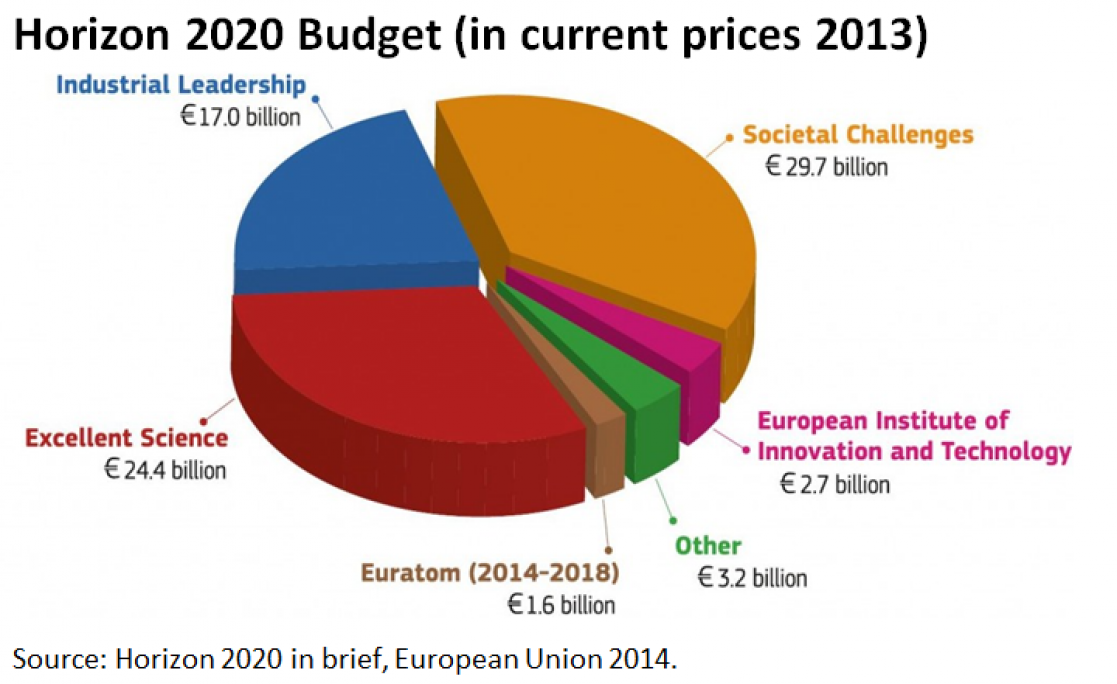Horizon 2020

Horizon 2020 is the EU's Framework Programme for Research and Innovation which runs from 2014 to 2020, with a budget of nearly EUR 80 billion (roughly JPY 10 trillion). It is fully open to international cooperation and is the EU's biggest research and innovation programme ever. It will lead to more breakthroughs, discoveries and world-firsts by taking great ideas from the lab to the market. Horizon 2020 is built around 3 pillars: Excellent Science, Industrial Leadership and Societal Challenges. The budget distribution of Horizon 2020 is shown below.

Cooperation Opportunities for Japanese researchers
- Japanese participation is possible in practically all Calls for Proposals of Horizon 2020, and may be specifically encouraged in certain cases.
- Horizon 2020 offers to Japanese academic or industrial researchers a unique gateway to Europe’s excellence in research and innovation, and access to Europe's knowledge, scientific data, world-class infrastructures and world-leading scientific networks.
Japanese research organisations may join consortia in collaborative research projects.
Short- and long-term mobility of researchers to and from the EU is an important driver of the EU-Japan research and innovation partnership. There are many opportunities through Marie Sklodowska-Curie Actions (MSCA) . Furthermore, the European Research Council (ERC), offers grants to outstanding researchers in order to carry out frontier research in Europe. Mobility of students, faculty and researchers is also supported through Erasmus+ .
Researchers from Japan, a similarly scientifically advanced, industrialised country, are however, not automatically funded through Horizon 2020 in collaborative projects except where a specific reciprocal arrangement has been put in place, or where it is specified in the Work Programme, or under exceptional circumstances. In all other cases, Japanese participants have to provide the resources needed for their part of the project work, either from own funds, or funds received from Japanese ministries, agencies, foundations and other organisations. Please note, however, that funding is available for Japanese researchers in the case of the individual fellowships or through ERC grants, as well as in the context of certain integrating activities for Research Infrastructures.
Work Programmes, providing detailed information on Calls for Proposals and funding priorities under Horizon 2020, are published every 2 or 3 years. The 2018-2020 Work Programme, which covers the last period of Horizon 2020, was published on 27 October 2017. EUR 30 billion will be invested in research addressing key political and societal priorities of the European Union, with special emphasis on international cooperation. There are 22 topics, which explicitly invite cooperation with Japan, but practically all topics are in fact open for such cooperation.
Act as an expert evaluator for Horizon 2020Distinguished Japanese researchers and innovators are strongly encouraged to register as prospective experts on the EU database. Registration is free of charge. This database is used by the EU to select and appoint peer reviewers of project proposals. Appointed experts receive a daily honorarium and reimbursement of travel and accommodation costs for their occasional short-term assignments. The desired areas of expertise comprise every research discipline included in the Horizon 2020 calls.





